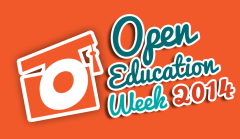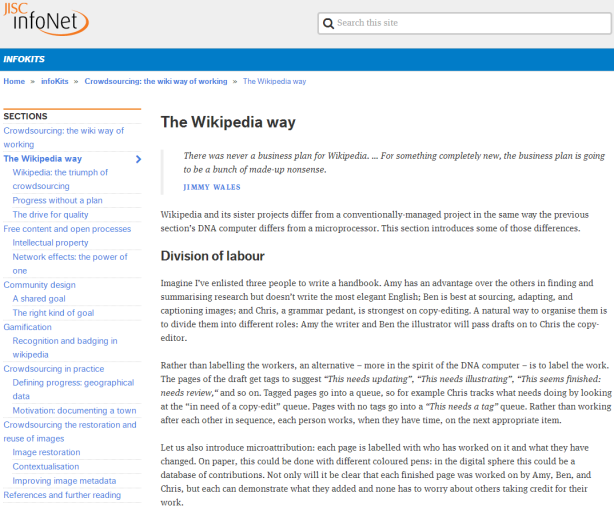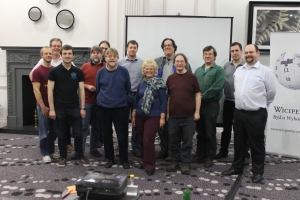Open Education and Wikipedia: Developments in the UK
Posted by Brian Kelly on 10 Mar 2014
 The third annual Open Education Week (#openeducationwk) takes place from 10-15 March 2014. As described on the Open Education Week web site “its purpose is to raise awareness about the movement and its impact on teaching and learning worldwide“.
The third annual Open Education Week (#openeducationwk) takes place from 10-15 March 2014. As described on the Open Education Week web site “its purpose is to raise awareness about the movement and its impact on teaching and learning worldwide“.
Cetis staff are supporting Open Education Week by publishing a series of blog posts about open education activities. Cetis have had long-standing involvement in open education and have published a range of papers which cover topics such as OERs (Open Educational Resources) and MOOCs (Massive Open Online Courses).
The Cetis blog provides access to the posts which describe Cetis activities concerned with a range of open education activities. My contribution to the series covers Open Education and Wikipedia: Developments in the UK.
Open Education and Wikipedia: Developments in the UK
About This Post
As I explained in a post which asked “How Are You Using Wikipedia?” I will be giving a presentation on use of Wikipedia in the UK’s higher education sector at the Eduwiki conference to be held in Belgrade on 24 March 2014.
Since this post is published in a series on open education it seems appropriate to adopt open practices in the preparation of the talk. I am therefore ‘flipping’ my talk and have made my slides available on Slideshare (and embedded below) in advance of the Eduwiki conference.The slides are accompanied by this blog post which summarises the key points I intend to make in the talk. I welcome comments which I may be able to incorporate in the talk when I deliver it in a few weeks time. The availability of this blog post may also provide a complementary perspective on the slides which may be helpful in expanding on points which may not be obvious from viewing the slides in isolation.
A Wikipedia Approach to the Presentation
 It seems appropriate for a talk about Wikipedia which is being hosted by a Wikimedia chapter to adopt Wikipedia principles of openness and citation of sources in the talk itself.
It seems appropriate for a talk about Wikipedia which is being hosted by a Wikimedia chapter to adopt Wikipedia principles of openness and citation of sources in the talk itself.
The slides will therefore be available under a Creative Commons (CC-BY) licence. In addition the delivery of the slides will be available under the same licence, with recording or broadcasting of the talk being explicitly welcomed.
The slides themselves will be made available in advance. The slides will contain embedded links to resources mentioned in the talk or supplementary evidence or assertions made.
Slow Acceptance of the Value of Wikipedia in Higher Education
I will describe the initial resistance to use of Wikipedia in higher education. However we are now seeing growing acceptance of its value with recent editing sessions for groups such as research scientists and librarians indicating the growing interest. Ironically the title of a talk at the LILAC 2014 conference (“Wikipedia: it’s not the evil elephant in the library reading room“) suggests there is a need to address concerns that Wikipedia is an “evil elephant” which we may know exists but are reluctant to acknowledge. The title of an edit-a-thon session at the conference (“Improving the Information Literacy entry on Wikipedia: LILAC’s first edit-a-thon!“) again shows that this is a new area Progress is happening, but Wikipedia, and especially updating Wikipedia articles, should not, yet, be considered a mainstream activities in higher education.
The Eduwiki 2013 Conference
The Eduwiki 2013 conference took place in Cardiff on 1-2 December 2013. This was the second such conference hosted in the UK. I have previously provided a report on the conference. In this post I will highlight two of the talks:
- Safe Use of Wikipedia in the Transition from School to University by Lisa Anderson and Nancy Graham, University of Birmingham.
- Introducing Students to Independent Research through Editing Wikipedia Articles on English Villages by Humphrey Southall, University of Portsmouth
These two talks addressed complementary aspects relevant to use of Wikipedia is higher education: how librarians can address information literacy by explicitly covering the strengths and weakness of Wikipedia and ways in which students can update Wikipedia articles as part of a formal assignment.
The presentation will go into more detail of the key aspects of these two talks. I should add that the slides used by Humphrey Southall in his presentation are available on Slideshare.
The Jisc Wikimedia Ambassador
The funding of a Wikimedia Ambassador for the period July 2013 – March 2014 by the Jisc was a welcome development which demonstrated how a funding body was willing to fund an initiative aimed at encouraging take-up of Wikipedia within the UK’s higher education sector. The work of the Jisc Wikimedia Ambassador has included delivering six sessions and supporting three edit-a-thons, a Jisc infoKit on Crowdsourcing: the Wiki Way of Working and a project blog as well as a series of reports on the work.
Looking to the Future
 The Wikimania 2014 event will take place in London on 6-10 August 2014. As described on the event web site:
The Wikimania 2014 event will take place in London on 6-10 August 2014. As described on the event web site:
Education will be a key theme throughout the whole event, and while we will be honouring past achievements, this year Wikimania will always be looking forward to the Future of Education.
The key areas to be addressed at the event are:
- Overcoming friction: “librarians and educators are starting to teach students how they can use Wikipedia effectively. Like any other encyclopaedia, students are being shown how to use the site to find the helpful links to primary and secondary sources that are precisely the material students should be citing in their research”.
- Knowledge is produced, not consumed: “Instead of being passive receivers of information, students become the creators and curators of knowledge. Wikipedia becomes an opportunity, not a threat, to formal education, and the educators’ role becomes facilitating a shift from simply teaching answers, to teaching how to ask questions”.
These two areas reflect the topics of the talks given by Lisa Anderson / Nancy Graham and Humphrey Southall which I highlighted earlier in this post.
Since the Wikimania event is still inviting submissions (the closing date is 31 March 2014) I am not able to speculate on the issues which will be addressed at the event. Instead I’ll give my thoughts on important areas which will build on existing activities:
- Promoting use of other Wikimedia projects: A poster on PastPlace: the historical gazetteer service from the people who brought you A Vision of Britain through Time highlights plans for building on the Vision of Britain work which Humphrey Southall described in his talk at Eduwiki 2013. This project will build on data from Wikidata, “a free knowledge base that can be read and edited by humans and machines alike“.
 Promoting better understanding of relevance of Wikipedia in education: The Wikipedia article on Crowdsourcing describes how:
Promoting better understanding of relevance of Wikipedia in education: The Wikipedia article on Crowdsourcing describes how:
Crowdsourcing is the practice of obtaining needed services, ideas, or content by soliciting contributions from a large group of people, and especially from an online community, rather than from traditional employees or suppliers“
The article goes on to explain how “the term “crowdsourcing” is a portmanteau of “crowd” and “outsourcing“. However the relevance of crowdsourcing is not widely appreciated in higher education, with the word “outsourcing” possibly leading to concerns due to its political connotations. One of the significant deliverables from the Jisc Wikimedia Ambassador project was the production of a Jisc infoKit on Crowdsourcing. Resources such as this should help to provide a better understanding of the theories behind crowdsourcing and its relevance to Wikipedia.
- Promoting Wikipedia editing by ensuring there are well-trained trainers: Back in October 2013 an article entitled “The Decline of Wikipedia” argued that “The loose collective running the site today, estimated to be 90 percent male, operates a crushing bureaucracy with an often abrasive atmosphere that deters newcomers who might increase participation in Wikipedia and broaden its coverage“. The article concluded:
But that community also constructed barriers that deter the newcomers needed to finish the job. Perhaps it was too much to expect that a crowd of Internet strangers would truly democratize knowledge. Today’s Wikipedia, even with its middling quality and poor representation of the world’s diversity, could be the best encyclopedia we will get.
Concerns over the alleged “abrasive atmosphere that deters newcomers who might increase participation in Wikipedia” are being addressed. Wikimedia UK runs a Training the trainer course which aims to:
- Recognise the importance of diversity in the training context
- Respond appropriately to the needs of volunteer trainers
- Understand the impact of different learning and communication styles when designing and delivering training
- Use active listening to guide their interaction with participants
- Give effective and appropriate feedback to other participants
I should add that I attended theTrainer the Trainers course which was held in Cardiff on 1-2 February. The accompanying image (taken from the Wikimedia Commons web site) shows the participants at the course.,
- Maximising the pool of potential contributors: Last week an article in the Guardian pointed out that “It is thought that only around one in 10 of its editors are female“. In another article published the previous week in the Guardian entitled “Stop female scientists being written out of Wikipedia history Dame Athene Donald, fellow of the Royal Society & Professor of Experimental Physics at Cambridge University went on to point out that “Many female scientists are either not there at all on Wikipedia or just [have] stubs.
The concerns regarding lack of female involvement in Wikipedia editing are illustrated by the photograph of the participants at the Training the Trainers course, with the only woman in the photograph being the course trainer.
However such concerns, together with concerns regarding the lack of content about noteworthy females, are being addressed. In March there are no fewer than six events which are addressing these issues: Women in Science Wikipedia Edit-a-thon; Women’s Art Practices editing event; Women Archaeologists editing event; Scottish Women in Contemporary Art Edit-a-thon and Scottish Women in Computing Edit-a-thon.
As well as the need to increase the pool of female contributors to Wikipedia there is also a need to make it easier for people with disabilities to create content in Wikipedia. The Accessibility of the Wikimedia UK website project focus is on making Wikipedia resources more accessible for people with sight problems; hearing problems; mobility problems and cognitive impairments. However in conjunction with the WikiProject Disability project which aims to “co-ordinate the improvement and creation of articles related to Disability” we might expect to see edit-a-thons being organised which aim to provide people with disabilities with the the skills needed to contribute to Wikipedia.
Education Strategy
I’ve given a brief view of various Wikipedia developments within the UK’s higher education sector and provided suggestions on further developments which would help to take Wikipedia beyond the early mainstream adopters and become more embedded within the higher education sector.
 But such issues need to be consider at a strategic level. Wikimedia UK are working on an Education strategy but, as illustrated, this is currently under development. As might be expected in a Wikipedia environment user input into the process of development of the strategy is encouraged, with the Education Strategy talk page currently having brief sections on:
But such issues need to be consider at a strategic level. Wikimedia UK are working on an Education strategy but, as illustrated, this is currently under development. As might be expected in a Wikipedia environment user input into the process of development of the strategy is encouraged, with the Education Strategy talk page currently having brief sections on:
- OER university model
- Primary and Secondary schools
- Language learning
- Theory of Knowledge
Would anyone like to contribute further suggestions for the development of Wikimedia UK’s education strategy?
View Twitter conversations and metrics using: [Topsy] – [bit.ly]





Open Education and Wikipedia: Developments in t... said
[…] The third annual Open Education Week (#openeducationwk) takes place from 10-15 March 2014. As described on the Open Education Week web site "its purpose is to raise awareness about the movement and… […]
Open Education Week - Cetis posts | Cetis - expert advice on educational technology and standards said
[…] In the first post this week Brian Kelly considers Open education and the uptake of Wikipedia in UK universities and colleges. […]
Reflections on the #openeducationwk Blog Posts « UK Web Focus said
[…] Open Education and Wikipedia: Developments in the UK […]
A report from the EduWiki Conference in Serbia | Wikimedia UK Blog said
[…] had previously written a blog post on Open Education and Wikipedia: Developments in the UK which went into some detail of some of the key activities I would describe in my presentation: […]